On the first Saturday of every month, a book is chosen as a starting point and linked to six other books to form a chain. Readers and bloggers are invited to join in by creating their own ‘chain’ leading from the selected book.
Kate W: Books are my favourite and best
I reserved this month’s starter book, Time Shelter, by Georgi Gospodinov from the library, but it’s only just come in, so I have yet to read it. However, I gather that an enigmatic flaneur named Gaustine opens a ‘clinic for the past’ that offers a promising treatment for Alzheimer’s sufferers: each floor reproduces a decade in minute detail, transporting patients back in time.
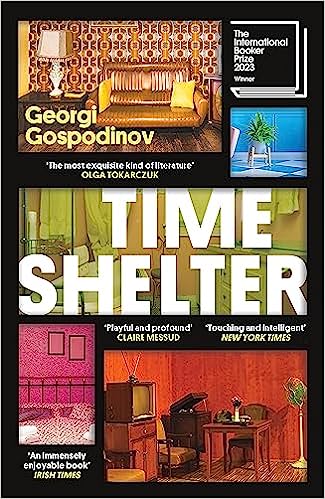
This immediately reminded me of Claire Fuller’s The Memory of Animals, which also opens a window on the past. This is a novel no doubt inspired by Lockdown, in which our young heroine is incarcerated in a hospital as part of a drugs trial which isn’t completed because the world at large goes into melt-down as a result of an untreatable variant of the virus rampaging round the world. Whilst there, another participant introduces her to the Revisitor, a device which allows her to re-experience her past life, which has been full of drama and error. It’s all a bit odd as a device for flashback. As are her letters to H, the revealing of whose identity would be a spoiler alert. Unsatisfactory, uninvolving, with too many plot-lurches, this is far from Fuller at her finest.
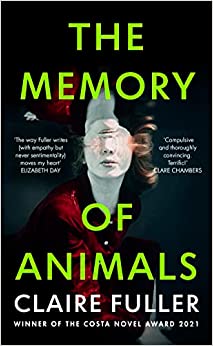

We travel to the past in my next book: Sheila Armstrong’s Falling Animals.When Oona spots a man apparently resting on the beach in a small Irish seaside town, it’s not immediately that she realises he’s dead. Who is he? How has he died? These questions remain unanswered by Police, the pathologist, and he is finally buried, unknown. But it’s not the end of the story. Each chapter of this lyrically written book introduces us to someone else who may have had a connection with the deceased – often very many years ago. We travel to other countries, to ships at sea: and connections with the man, and with this small town weave themselves into the story from distant lands and cultures. It’s deftly, often poetically done, and the book ends a year after the body was first discovered. Is the man finally identified? You’ll have to read the book to find out, and I highly recommend you do so.


Looking to the past informs my next choice: The Colony, by Audrey Magee. We’re in Ireland in 1979, on a small, sparsely populated and isolated island, whose inhabitants have only recently started to learn and use English. Two visitors come to spend their summers there. Mr. Lloyd is a painter who wants to explore the landscape. He’s rude and entitled, but interesting to young islander James who has ambitions to go to art school. Masson, known as JP, is a French academic, keen to preserve and promote the Irish language, whether the inhabitants want it or not. Each chapter is interspersed with a terse newspaper-like account of a sectarian murder on the mainland, whether of a Catholic or a Protestant. At first these almost seem an irrelevance. Gradually, the penny drops that these incidents are deeply rooted in the history of the English towards their Irish ‘colony’, and do much to explain the largely hostile feelings both of the islanders and its two visitors. The book paints a picture of an island in many ways left behind, whose characters still struggle to find their place in the world, as indeed do the two visitors. A book to provoke thought long after the last page has been turned.
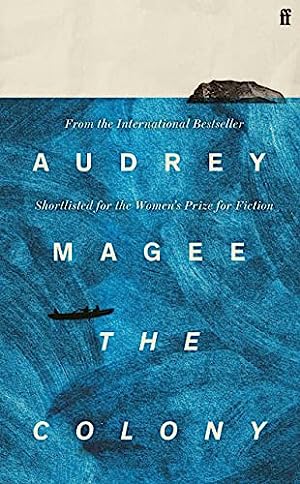

Let’s stay in Gaelic territory, but shift to Scotland. Love of Country by Madeleine Bunting. I’ve never been to the Hebrides, nor even really thought of going. This has changed, thanks to this book. Bunting makes a journey through the wild and remote islands of the Hebrides, focusing on seven in particular. This book recounts her explorations. Everything is potential material. The wild and severe beauty of the place touches her soul, and she writes poetically and personally about this. She explores geology, natural history, bird life, literature, and above all the sad and often wretched history of the people of these isolated places, and the people who sought to dominate or exterminate them. I found this a moving and fascinating book, and I’ll return to read other work by Bunting.
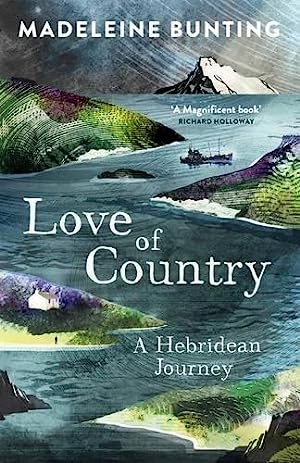

Poverty is what defines my next book: Down and Out in Paris and London, by George Orwell, set in Paris and London in the late 1920s. In one sense an easy read, in that the narrative sweeps the reader along: in another, difficult, because the story, describing conditions of brutal poverty as a ‘plongeur’ in a Paris hotel kitchen, then as an English tramp in southern England is unappetising in the extreme. The diary-like narrative is interspersed with anecdotes from the lives of other characters, such as his Russian friend Boris, and with more political reflections to make a striking and unforgettable short book. His characterisations of the men that he meets – and they’re nearly always men – are lively, and rounded, and put us in touch with the reality of existing on a meagre diet lacking substance and nourishment, of always being hungry, of either being unrelentingly overworked (Paris) or unrelentingly under occupied and bored (London) . The spikes may have changed, but is the reality of existence for the homeless really so very different now?
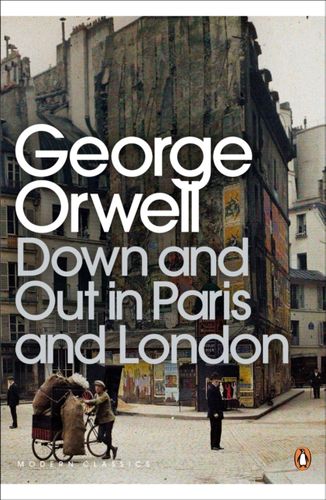

My last choice links with Orwell, with a Gaelic location and not much else. It’s The Last Man in Europe, by Dennis Glover. Focusing on the last years of his rather brief life, while occasionally diving back to earlier times – Orwell’s part in the Spanish Civil War for instance – this fictional-though-based-on-fact account mainly has as its subject Orwell’s last years on the Scottish island of Jura. This is a bleak and wholly unsuitable place for a man already dying from tuberculosis. Orwell was there to write his last novel, at first called The Last Man in Europe. We know it by the title he soon gave it – Nineteen Eighty Four. The book is assured in painting a picture of Orwell’s life in shabby-genteel poverty, of his somewhat cavalier attitude towards his colleagues and the women he bedded, and his wives, and most particularly of his changing political thought processes which would come to fruition in his last and probably greatest book. Now I need to go back and read the lot again, and not just Down and Out ….
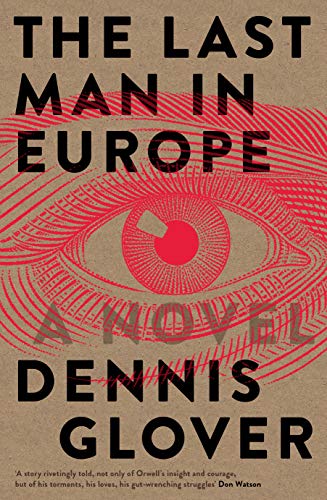

This month’s chain barely ventured beyond the British Isles and Ireland, but next month we begin in America, with Curtis Sittenfeld‘s Romantic Comedy.

Brava! I really liked how you put this chain together.
LikeLiked by 1 person
Oh, thanks so much! Yours may remain unread till I get back from a break with the family and I don’t have to do battle with my phone. Looking forward to reading it!
LikeLiked by 1 person
I’m always fascinated by the sequence, Margaret, though they are often books I wouldn’t have chosen to read. I’d be happy with Bunting in the Hebrides and probably the Armstrong. It’s not always possible to know what constitutes a good book until you’re reading it. In the last handful I picked up from the charity shop was Delderfield’s ‘To serve them all my days’. I wasn’t sure at the time but it’s turned out to be my best read in a long time.
LikeLiked by 2 people
Charity shops and libraries are great opportunities to try something we might not be at all certain of. I loved the Armstrong and didn’t find it heavy going at all.
LikeLiked by 1 person
A great chain as always, Margaret. The only one I’ve read is the Orwell and not many of the others are calling to me – they seem to need to much thought about social issues we never overcome! But I have to say I have now added Memory of Animals to my loooong reading list.
LikeLiked by 1 person
I’ll be interested in hearing how you get on with it. I was so disappointed.
LikeLike
Oh dear, sorry to hear you didn’t care for The Memory of Animals as I have a signed copy sitting on my bookshelf. I think it may be there for a while now.
LikeLiked by 1 person
Ah well. She’s a good author, and when I saw a Zoom presentation by her, I really warmed to her. But this one did disappoint.
LikeLike
Two of these have been waiting on my TBR–Down and Out and The Colony, both of which I hope to get to soon. And you have me very intrigued by Fallen Animals, I think I’m going to like seeing where that journey takes me. 🙂
LikeLiked by 1 person
Maybe you’ll tell us how you reacted in a future Six Degrees!
LikeLiked by 1 person
Fingers crossed 🙂
LikeLiked by 1 person
Some lovely picture pairings here. I had a horrible feeling about the Fuller and have avoided it partly because I’ve been such a fan of her previous novels.
LikeLiked by 1 person
Sadly, I have to agree this is the right decision for this one.
LikeLiked by 1 person
What an interesting chain! None of these are books that I would necessarily have chosen to read myself (except maybe the Orwell) but I’m curious about some of them now. Falling Animals sounds particularly tempting!
LikeLiked by 1 person
You’re not the only one to have been tempted by my review of Falling Animals. So much better than Fuller’s Animal offering.
LikeLike
An interesting chain Margaret. I would wholeheartedly recommend an adventure across the Hebrides. It is, however, not a budget travel destination and is a complete gamble with regard to seas and weather!
LikeLiked by 1 person
Peter, you are definitely among the select group who have put the Hebrides in my mind. Will pack neither the swimming costume nor the sun cream!
LikeLiked by 1 person
I know a mermaid up there who will happily take you swimming!
LikeLiked by 1 person
I’ve ‘met’ her now. An excellent guide, I think.
LikeLiked by 1 person
Ah, the Gospodinov and the Bunting for me….an interesting chain
LikeLiked by 1 person
I have started the Gospodinov now. I’m not at all sure how far I shall struggle on. It’s not enticing me in. The Bunting however is much more accessible.
LikeLike
Tod bad, Fuller’s plot did sound good.
I have really enjoyed Orwell’s book in Paris. You are right, I found it very contemporary, alas.
LikeLiked by 1 person
Best try it for yourself then. Reviews are VERY mixed, but some are positive.
LikeLiked by 1 person
Oh for goodness sake! Now I want to read practically every book you’ve mentioned 😖 Enjoy your break with the family. I’ve just come back from my break with the southern branch. Yorkshire beckons. I’ll be in touch hopefully 😊
LikeLiked by 1 person
Oh, good, Sandra. I await news. You should know better than to read 6 Degrees posts if you wish to maintain a trim TBR pile!
LikeLiked by 1 person
Too bad about the Fuller novel. I’ve heard others expressing a similar sentiment. I really enjoyed her previous novel, Unsettled Ground, but won’t be picking this one up. Falling Animals, on the other hand, sounds good!
LikeLiked by 1 person
Falling Animals is definitely worth your time. So sad that the Fuller isn’t, in my opinion.
LikeLiked by 1 person
Margaret, I always look forward to reading your 6 Degrees posts. Your reading has much more breadth than mine. Interesting chain and while I always tempted I already have a stack that I plan to read.
LikeLiked by 1 person
You stick with your pile! I’m always getting tempted by some review or other with the result that my pile constantly totters and tumbles.
LikeLiked by 1 person
Can’t recommend the Hebrides highly enough, especially the Outer islands, so I’m glad Bunting has inspired you. However, for her to call them remote is a very London-centric view! They are very accessible these days, even more so when the ferries aren’t screwed up.
LikeLiked by 1 person
I’m sure you’re right, Anabel. But this Yorkshire lass thinks of the Hebrides as more remote than most of Europe. Which may be wrong, but it’s also a typical view here. In fact virtually all the islands off Scotland seem exotically inaccessible and mysterious to the average English person.
LikeLike
Yet many of them are vibrant, working communities – just like anywhere else, but with a bit more sea!
LikeLiked by 1 person
I always look forward to seeing this post, you read such interesting and diverse books, many of which are unknown to me. I hope you’ll let us know how you find the Georgi Gospodinov book. It sounds interesting. I shall look for the Bunting one as I have often thought about the Hebrides, doubt we’ll get there now, but reading about them could be second best.
LikeLiked by 1 person
See my comment to Sue about the GG! My husband actually nabbed it before I got to it, and didn’t enjoy it, but our reading tastes aren’t always the same. Yes, the Bunting did whet my appetite to go there, but, like you …
LikeLike
I’ve reserved the Bunting book and her more recent one too. I’m afraid that if I book doesn’t grab me in the first couple of chapters I stop reading now, whereas once I would have persisted.
LikeLiked by 1 person
I would have agreed with you once. These days, unless I really can’t cope, I try to give it 100 pages or so. I’m quite often rewarded.
LikeLiked by 1 person
Great links Margaret … and I’m pleased to see a couple of books I actually know, and one I’ve read and loved recently, The colony. It’s hard to forget, isn’t it?
LikeLiked by 1 person
I agree. At first it just seemed an ordinarily good read. But it has greater depth than that, doesn’t it?
LikeLike
It really does — so many layers to the idea of colonisation – from the point of view of the colonised and the colonisers.
LikeLiked by 1 person
Great links. I had to go to Google Chrome again in order to comment. But at least I managed. LOL
“Down and Out in Paris and London” will be my read for “Paris in July” this month.
My Six Degrees of Separation took me from Time Shelter to Primeval and Other Times by Olga Tokarczuk.
LikeLike
I’ve just found this in spam…
LikeLike
At least it ended up there and wasn’t swallowed entirely.
LikeLiked by 1 person
All the same …
LikeLike
I made a note of three of these. I had thought you were going to end with ‘The Last Man’ by Mary Shelley at first glance.
LikeLiked by 1 person
I have to admit to not having read any Mary Shelley. A gap in my education.
LikeLike
I thought I’d commented here already but it looks like I didn’t. Or it was swallowed by the internet.
I am currently reading “Down and Out in Paris and London” for my Paris in July challenge.
My Six Degrees of Separation took me from Time Shelter to Primeval and Other Times by Olga Tokarczuk.
LikeLike
Oh Marianne, perhaps we both have to accept that WP and Blogger have taken against our commenting on one another’s posts. The same has happened to me with yours, it seems. WP and Blogger both need to take a hard look at themselves and stop messing innocent bloggers about!
LikeLike
I know. I just checked on Google chrome where I found this:
Your comment is awaiting moderation.
I thought I’d commented here already but it looks like I didn’t. Or it was swallowed by the internet.
I am currently reading “Down and Out in Paris and London” for my Paris in July challenge.
My Six Degrees of Separation took me from Time Shelter to Primeval and Other Times by Olga Tokarczuk.
I am sure you would have accepted it, had you found it.
LikeLiked by 1 person
Dead right I would! And have read – and enjoyed – your post. I commented too, but realised immediately that it hadn’t got through. What to do eh?
LikeLike
I did get one comment from you on my Paris in July post. How did you manage that? LOL
LikeLiked by 1 person
Like the Peace of God, it passeth all understanding!
LikeLiked by 1 person
I really like your reviews because they go beyond the book itself to look at context and underlying philosophy and the 6 degrees encourages that … Good chain!
https://how-would-you-know.com/2023/07/6-degrees-of-separation-time-shelter.html
LikeLike
Well, thank you! I do prefer a chain which – like yours – attempts to offer a flavour of the book so that the reader can decide if it’s for them or not.
LikeLike